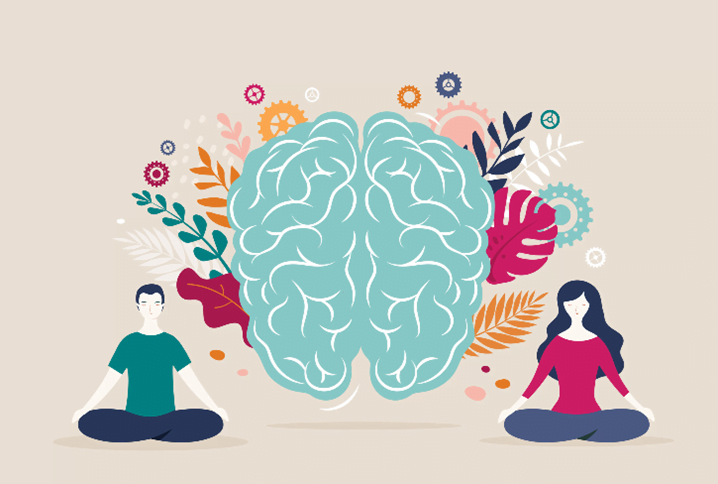Governance
Context: Recently, the 5th Global Mental Health Summit, cosponsored by more than a half-dozen mental health organizations, was held in Chennai in December 2022 to discuss mental health in the context of human rights, ethics, and justice.
- It emphasized the importance of mental health and issued a call to action against society’s general neglect and, in particular, the governments at the federal and state levels.
About Mental Health:

- It is a state of mental well-being that enables people to cope with the stresses of life, realize their abilities, learn well and work well, and contribute to their community.
- The World Health Organization (WHO) defines health as ” a state of physical, mental, social and spiritual well-being and not merely the absence of disease or infirmity”.
- WHO defines mental health as mental well-being in which an individual realizes his or her own abilities, can cope with the normal stresses of life, can work productively and is able to contribute to his or her community.
- In this sense, mental health is the foundation for individual well-being and the efficient operation of a community.
- It is a basic human right. And it is crucial to personal, community, and socio-economic development.
Types of Mental Disorders:

Causes of Mental Illness:
- Individual psychological and biological factors such as emotional skills, substance use and genetics can make people more vulnerable to mental health problems.
- associated with them have had a detrimental effect on mental well-being
- Early adverse life experiences, such as trauma or a history of abuse (for example, child abuse, sexual assault, witnessing violence, etc.)
- Exposure to unfavourable social, economic, geopolitical and environmental circumstances – including poverty, violence, inequality and environmental deprivation – also increases people’s risk of experiencing mental health conditions.
- Over the past two years, the pandemic-led lockdowns and the uncertainties lead mental illness
- Use of alcohol or drugs
- Having feelings of loneliness or isolation.
Issues and Concerns associated with mental illness:
- Mental health problems have been growing rapidly over the last few decades.
- In 2015, the GOI carried out a National Mental Health Survey — 2015-16 to assess the prevalence of mental health in the country.
- The report showed mental disorders at 10.6 per cent among above 18-year-olds, 16 per cent among the productive age group of 30-49-year-olds — and lifetime morbidity affecting 150 million people with one per cent reporting high suicidal risk.
- The human resources and treatment facilities are woefully low.
- For policymakers, mental health is a low priority.
- Such poor policy attention is often ascribed to indifference among bureaucrats and politicians.
- Designing a policy is the most challenging piece of policy-making.
National Mental Health Survey
- The Government of India conducted a National Mental Health Survey — 2015-16 in 2015 to assess the prevalence of mental health in the country.
- According to the report, mental disorders affect 10.6 percent of people over the age of 18, 16 % of people in the productive age group of 30-49 years old, and 150 million people have lifetime morbidity, with one percent reporting a high suicidal risk. Even so, human resources and treatment facilities are woefully inadequate.
- Madhya Pradesh 0.05 psychiatrists per lakh people, and the treatment gap in India is approximately 80%.
- In 2019, the Union government allocated Rs 600 crore to tertiary institutions such as NIMHANS and medical college psychiatry departments, leaving only Rs 40 crore for the District Mental Health Programme and other community-based initiatives, despite an estimated need of over Rs 93,000 crore investment to address this massive morbidity.
- Only Rs 2.91 crore of the pitiable sum of Rs 40 crore was spent.
Need of Mental Health Policy
- Without the active participation of community leaders, implementation among the poorest and most marginalized, particularly criminalized groups, would have been impossible.
- Despite the fact that the central government fully funded the central sector program, each intervention was developed with active participation and dialogue among the states and, more importantly, the affected constituencies.
- A similar approach is required when developing a good, implementable mental health strategy.
- It is so intertwined with the type of society we live in — the pressures and stress caused by poverty and growing inequalities of opportunity, the frustrations of joblessness, the judgmental and discriminatory environment due to social barriers of caste, gender, religion, and so on are powerful triggers — that if completely unaddressed, the ailment can recur despite medication.
- The limitations of the biomedical approach and confining patients in hospitals are now recognized and supported by evidence.
- Mental health is even more complicated than HIV/AIDS because mental disorders are not a one-time ailment that can be cured with certain medications.
Government of India Initiatives:
- The Government has developed comprehensive Training Modules for Healthcare Providers to deal with Post COVID Mental Health Issues to equip Doctors, Nurses, paramedical healthcare workers, community health workers and other frontline workers with knowledge and skills to provide psychosocial support to those affected by post COVID mental health issues.
- the Government has announced a “National Tele Mental Health Programme” in the Budget of 2022-23, to further improve access to quality mental health counselling and care services in the country.
- As mandated by the Mental Healthcare Act, of 2017, mental healthcare services have been integrated into general healthcare services like National Health Mission, PMSSY, Rashtriya Kishore Swasthya Karyakram, AYUSHMAN Bharat, PMJAY, etc.
Source: Indian Express














